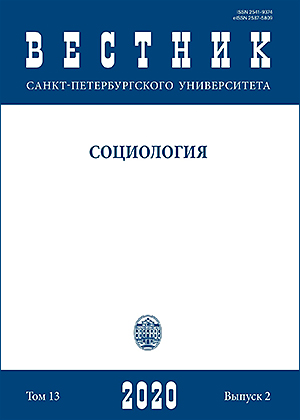On the role of the “global North–South” notions in global sociology
DOI:
https://doi.org/10.21638/spbu12.2020.201Abstract
The paper focuses on the two main directions: a retrospective analysis of the stated concepts and the analysis of their role in global sociology. This work is devoted to the concepts of the “global North–South” and their history in the context of (global) sociology. The article focuses on a historical and sociological reconstruction of the these notions’ existence as well as the process of the transition of the concepts to global sociology and their role in the discussion.
It was also demonstrated the interconnection of the “third world” category with the “global North–South” and their mutual influence on each other. The process of reducing of the “third world” notion usage and its gradual transformation into a “global South” category is analyzed. The paper postulated the idea that after the transition of the global sociology concepts, they mostly lost their geographical basis and were formed as the notions of the epistemological
nature. Initially, such concepts were non-sociological and were often used during discussions in economics and in political studies. Nevertheless, North–South appeared in the sociology relatively recently and coincide chronologically with the beginning of the discussion about global sociology and during short period of time became important elements in the global sociology disputes. The dichotomy “global North–South” mediates a large number of the discussions in the research field, which are related to the claims of the South about the sociological dominance of the North and about the right of southerners to offer their own indigenous concepts. The paper investigates the connection of the sociologists with these categories, which play a significant role and stimulates a wide range of arguments. The paper concludes that geographical determinism is speculative and more related to the ideological attitudes of the authors, which are reproduced in the researched field.
Keywords:
third world, global North, global South, global sociology, Brandt line
Downloads
References
References
Downloads
Published
How to Cite
Issue
Section
License
Articles of "Vestnik of Saint Petersburg University. Sociology" are open access distributed under the terms of the License Agreement with Saint Petersburg State University, which permits to the authors unrestricted distribution and self-archiving free of charge.




